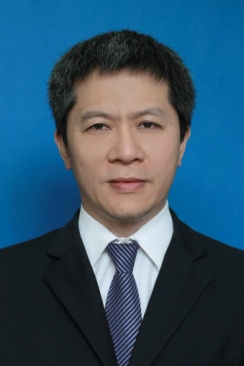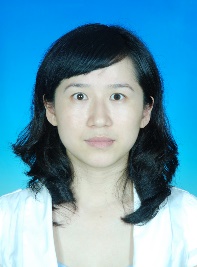Workshop title: Big Data and Decision Intelligence Theory and Technology
Chair: Prof. Xin NIE,School of Computer Science & Engineering, Wuhan
Institute of Technology
Keywords: big data, intelligent decision-making, information fusion, incremental learning
Workshop title: Multi-modal fusion modeling in artificial intelligence
Chair: Prof. Duanbing Chen,University of Electronic Science and Technology
of China
Keywords: Multi-modal fusion, Artificial intelligence, Feature representation
Workshop title: Big Data and Artificial Intelligence
Chair: Prof. Shan Liu,Communication University of China
This workshop aims to bring together the latest research progress of academic and industry researchers, such as big data science and foundations, big data infrastructure, big data management, big data search and mining, big data learning and analytics, data ecosystem, big data applications, artificial intelligence and technology, natural language processing, expert systems, multi-agent systems, knowledge engineering, neural network theory and architectures, artificial intelligence in modelling and simulation, pattern recognition, complex system, intelligent system, intelligent control, speech recognition and synthesis, machine translation, computer perception, machine learning, intelligent robot, image processing and computer vision and so on. We encourage prospective authors to submit related distinguished research papers on the subject of big data and artificial intelligence.
Keywords: Big Data, Artificial Intelligence, Data Mining, Data Science, Natural Language Processing, Expert Systems, Multi-Agent Systems, Knowledge Engineering, Neural Network, Pattern Recognition, Complex System, Intelligent System, Intelligent Control, Speech Recognition and Synthesis, Machine Translation, Computer Perception, Machine Learning, Intelligent Robot, Image Processing and Computer Vision
Workshop title: Large Language Models Application and Security
Chair: Prof.Jianquan Ouyang, Xiangtan university
In terms of applications, large language models have found widespread use across multiple domains. They can assist in natural language understanding, translation, summarization, content generation, chatbots, and even code generation. These models have the potential to revolutionize industries such as customer service, content creation, and education by automating tasks that traditionally required human intervention.
However, along with their immense potential, large language models also raise security concerns. One major issue is the generation of misleading or malicious content. These models can inadvertently produce false information, spread misinformation, or be exploited to generate harmful content like hate speech or propaganda. The responsible use and deployment of large language models require careful monitoring, content filtering, and ethical considerations.
Another security concern is the potential for model inversion attacks. Attackers could use the model's responses to infer sensitive information about the training data or exploit vulnerabilities in the model's architecture to extract confidential information. Protecting the privacy and security of the underlying training data and preventing unauthorized access to the model itself are critical challenges that need to be addressed.
To mitigate these risks, researchers and developers are exploring techniques such as adversarial training, bias detection and mitigation, content filtering, and fine-tuning models on specific domains to improve their safety and security. Additionally, promoting transparency, accountability, and responsible use of large language models is crucial to ensure their positive impact while minimizing potential harm.
As the field of large language models continues to evolve, ongoing research and collaborations between industry, academia, and policymakers will be essential to address the security challenges and harness the benefits of these powerful AI systems responsibly.
Keywords: large language model; security; alignment
Workshop title: Application and Challenge of Deep Learning in Intelligent
Medical Image Processing
Chair: Prof.Tao Zhou, School of Computer Science and Engineering, North
Minzu University
This workshop aims to describe the latest deep learning methods and biological and biomedicine applications. We hope that codes from methodology and data from real-world applications can all be presented in this workshop. The workshop also aims to guide deep learning researchers to examine more biomedical engineering applications and expand the vision of medical researchers in the field of deep learning.
Keywords: Deep learning; Medical image processing; Computer-Aided Diagnosis
Workshop title:Recent Developments in Mathematical Models for Data Intelligence Applications
Chair 1: Assoc. Prof. Meng Lei, China University of Mining and Technology
Chair 2: Prof. Yongwei Wang, Shanghai Institute for Advanced Study, Zhejiang University
Objective: This Special Issue aims to consolidate and present cutting-edge research, findings, and insights relating to the advancements in mathematical models utilized in data intelligence applications. It seeks to spotlight innovative methodologies, theoretical frameworks, and practical applications of mathematical models in unraveling complex data structures and patterns within diverse domains such as machine learning, artificial intelligence, data analysis, and predictive analytics.
Scope:
(1) Theoretical Advances:
a. Exploration and development of novel theories and methodologies in mathematical modeling enhancing data interpretation and analysis.
b. Evolutionary study of mathematical models adapting to the sophisticated needs of modern data intelligence.
(2) Application-Oriented Studies:
a. Examination of the real-world applicability of advanced mathematical models in fields like healthcare, finance, and IT.
b. Detailed case studies demonstrating the practical utility and adaptability of mathematical models in addressing and solving contemporary issues.
(3) Technological Integration:
a. Integration of mathematical models with state-of-the-art technologies for optimizing data-driven processes.
b. Study of the influence of mathematical modeling in refining algorithms and computational techniques in data science.
Anticipated Contributions:
We invite researchers, scholars, and practitioners to contribute original research articles, reviews, and studies that offer new insights, research findings, or theoretical frameworks in the field of mathematical modeling for data intelligence. The contributions should focus on, but are not limited to, the development, implementation, and application of advanced mathematical models, exploring their impact, challenges, and future prospects in data intelligence applications.
Outcome:
This Special Issue aspires to provide a comprehensive overview of the current state-of-the-art developments in mathematical models in data intelligence, offering a rich academic resource for enthusiasts, practitioners, and researchers. The diverse range of topics and methodologies covered will help in fostering new discussions, collaborations, and innovations in the application of mathematical models in data intelligence.
By focusing on the recent developments in mathematical models and their applications in data intelligence, this Special Issue will help in bridging the gap between theoretical advancements and practical implementations. It will play a crucial role in highlighting the unexplored potentials of mathematical models in advancing data intelligence applications, promoting a deeper understanding and exploration of this interdisciplinary field.
Keywords: Mathematical Models, Data Intelligence, Artificial Intelligence, Machine Learning, Data Analysis, Predictive Analytics, Application-Oriented Studies
Workshop title: AGPMES: Advanced Graph Pattern Mining for Emerging Systems
Chair: Assoc. Prof. Ruini Xue,University of Electronic Science and Technology of China
The aim of this workshop is to bring together the research accomplishments provided by researchers from academia and the industry to present, discuss and exchange ideas, results, work in progress and experiences in the area of architecture-aware approximate graph pattern mining. In particular, while we retain our focus on novel approximate graph pattern mining approaches, we also welcome work that exploring accurate mining and interdisciplinary researchers to showcase innovative research that leverage the emerging trends in graph pattern mining.
Keywords: graph pattern mining, approximate pattern counting, distributed systems
Workshop title: Blockchain and Artificial Intelligence
Chair 1: Assist. Prof. Yizhong Liu, Beihang University
Chair 2: Assoc. Prof. Qianyun Zhang, Beihang University
Keywords: Blockchain, federated learning, artificial intelligence
His research primarily focuses on cryptography, blockchain, and federated learning. As the first or corresponding author, he has published over 20 papers in esteemed journals and conferences, including IEEE Transactions on Dependable and Secure Computing, IEEE Transactions on Information Forensics and Security, and Computer Science Review, DCN, COSE, CN, FGCS, IEEE TNSE, ACISP 2021、TrustCom 2020, ICA3PP 2020.
Additionally, he holds eight authorized patents and has 12 pending patent applications. He holds several prominent academic positions and responsibilities within the academic community. He serves as a Co-Chair for the ICBCTIS 2023. Additionally, he takes on the role of Guest Editor for the journal Frontiers in Blockchain. He also actively contributes to the academic review process, participating as a committee member for various conferences and journals. He serves as a Program Committee Member for IEEE ICCT 2023 and is involved with conferences such as TrustCom 2022, Inscrypt 2023, and SmartBlock 2020, demonstrating his commitment to advancing research and knowledge dissemination in the fields of blockchain, computer science, and artificial intelligence. Furthermore, he dedicates his expertise as a reviewer for several prestigious international journals, including IEEE TPDS, IEEE TDSC, IEEE TII, IEEE TBD, IEEE TSMC. He has received several awards, including the Best Paper Award from the Journal of Cryptologic Research in 2022, and he was honored with the First Prize in the 2023 China Internet Security Competition.
She has published over 40 research papers, a chapter, and a monograph. She is the Associate Editor of IEEE OJAP, and the Cyber Security Committee member of Chinese Institute of Electronics. She has been selected into the Young Elite Scientists Sponsorship Program by China Association for Science and Technology. She is also the AINet 2022 co-chair and the symposium chair of IEEE ICCT 2023. She has been awarded best papers of KSEM 2022 and IEEE TrustCom MLSys Workshop 2021.
Workshop title: Application of Big Data and Artificial Intelligence in Urban Operation Managment
Chair 1: Prof. Lili Yang,Southern University of Science and Technology
Chair 2: Dr. Zhejun Huang,Southern University of Science and Technology
• Optimization models and algorithms for key resource allocation in urban operation management
• Application of the Internet of Things (IoT) in urban operation management
• Application of artificial intelligence and machine learning in urban operation management
• Application of real-time data analysis and big data management in urban operations
• Intelligent transportation systems applied within or between cities
• Ground, underground, and low-altitude transport logistics systems in urban operation management
• Big data analysis for risk assessment and disaster reduction in urban operations
• Optimization strategies and resilience analysis of the urban supply chain system
• Routing optimization and scheduling algorithms for urban freight or manned vehicles
• Intelligent decision support for disaster prediction and response in urban management
• Application of intelligent devices like Unmanned Aerial Vehicles (UAV) and autonomous vehicles in urban management
• Application of green technologies and strategies such as congestion mitigation and emission reduction for sustainable urban development
• Case applications of large-scale model empowerment and knowledge enhancement in urban operation management
• Lessons learned from various experiences and case studies in urban operation management.
Keywords: Big data, machine learning, artificial intelligent, urban operation management
Workshop title: Advanced Artificial Intelligence Applied in Industry and Agriculture
Chair 1: Prof. Yongjun Li, School of Physics and Electronics, Henan University
Chair 2: Dr. Dongming Zhang, School of Physics and Electronics, Henan University
Topics may include but are not limited to:
1、Advanced AI algorithms for agricultural and industrial processes.
2、AI-powered precision agriculture and sustainable agriculture.
3、AI in industrial process control, quality assurance, and predictive maintenance.
4、Use of AI in robotic agricultural processes.
5、Challenges and future prospects of AI in industrial and agricultural settings.
Keywords: Artificial intelligence (AI), Industry, Agriculture, Application, Algorithms
From 2005 to 2008, he was a Lecturer with the School of Physics and Electronics, Henan University. Since 2023, he has been an Professor. He has presided over and participated in a number of National Natural Science and Technology Funds, and took part in the Shaanxi Province Key Science and Technology Innovation Team Project. He has applied for six national invention patents and published more than 30 articles in Multimedia Tools and Applications, Optical Engineering, Journal of Electronic Imaging, Journal of Zhengzhou University, and Journal of Henan University. His research interests include image processing and artificial intelligence.
Workshop title: Chaotic System, Circuit and Application in Information Security
Chair: Prof. Lidan Wang,Southwest University
The chaotic system is characterized by extreme sensitivity to initial conditions, unpredictability, and aperiodicity. It can be implemented not only through analog circuits, but also through digital circuits such as MCU, DSP, FPGA, etc. A system can generate chaotic signals, and its nonlinearity plays an important role. As the fourth basic circuit component, the nonlinearity of memristor is often used to design new chaotic systems and circuits. Then, the chaotic system is used to generate random numbers that can be used as encryption keys. The unpredictable nature of chaotic system makes it extremely difficult for an attacker to predict the output of a chaotic system. Therefore, chaotic secure communication has also become a hot research field in recent years.
The purposes are to investigate the latest progresses in the field of chaotic system and secure communication, including but not limited to the following topics: chaotic circuit design and modeling, memristive chaotic system, chaos cryptography, image encryption algorithm, chaotic secure communication, the application of artificial intelligence in information security, etc.
Keywords: Chaotic system and circuit, Memristor, Information Security, Artificial Intelligence
Workshop title: Research on Robot Intelligence Based on Big Data
Chair 1: Prof. Mingshan Xie,Guizhou University
Chair 2: Dr. Yanfang Deng,Hainan University
Robot intelligence based on big data can also be applied in fields such as power grid maintenance, agricultural biotechnology, and industrial process control. By analyzing and mining big data, robots can more intelligently plan the optimal path for power maintenance, thereby improving the security of the power grid. In the field of agriculture, robot intelligence can be applied to agricultural biotechnology to help farmers improve the yield and quality of crops. In terms of industrial process control, robot intelligence based on big data can achieve automated and intelligent industrial production, thereby improving efficiency and reducing errors.
Welcome to submit relevant research for this paper collection, including but not limited to the following topics:
Big data analysis and mining methods in robot intelligence;
Robot path planning algorithm based on deep learning;
The application of intelligent robots based on big data in the field of education;
The application of big data-based robot intelligence in agricultural biotechnology;
The application of big data-based robot intelligence in industrial process control;
The challenges and future prospects of big data-based robot intelligence in industrial and agricultural environments.
Keywords: Robot intelligence, big data, deep learning
Workshop title: Intelligent Perception and Computer Vision
Chair: Prof. Ming Fang,School of Artificial Intelligence, Changchun University of Science and Technology
In this multidisciplinary domain, state-of-the-art technologies, such as deep learning, image recognition, object detection, and target tracking, are harnessed to simulate the complexities of the human visual system. These technologies are used in a wide range of fields, including autonomous vehicles, surveillance systems, facial recognition, medical image analysis, augmented reality, intelligent systems, 3D imaging and more, with the great potential to redefine human interactions with the surrounding world.
This workshop serves as a platform for in-depth exploration of the latest advancements and practical applications in the realm of computer vision, including areas such as image recognition, object detection, scene analysis, 3D display, intelligent robots and real-time decision-making. It highlights the convergence of deep learning, machine vision and intelligent systems, revealing their impact in areas such as autonomous vehicles, healthcare, surveillance, robots and military applications.
Keywords: Computer Vision; Intelligent Perception; Deep Learning; Machine Learning; Artificial Intelligence; Robot System
Workshop title: Big Data Application
Chair: Dr. Jianjun Zhang, College of Engineering and Design, Hunan Normal University
The aim of this workshop is to bring together the latest research results in the field of Big Data Application provided by researchers from academia and the industry. We encourage prospective authors to submit related distinguished research papers on the following topics. Please name the title of the submission with “paper title_workshop title”.
Big Data Applications and Software in Science, Engineering, Healthcare,Finance, Business, Transportation, Telecommunications, etc.
Big Data Analytics in Small Business Enterprises, Public Sector and Government.
Big Data Industry Standards.
Development and Deployment Experiences with Big Data Systems.
Keywords: big data application, big data analysis, big data industry standard, big data system
Workshop title: Big Data and Artificial Intelligence for Wireless Networks
Chair 1: Assoc. Prof. Hongming Zhang,Beijing University of Posts and Telecommunications
Chair 2: Assoc. Prof. Xiaoling Hu,Beijing University of Posts and Telecommunications
Keywords: Big data, artificial intelligence, wireless networks
Workshop title: Statistical Learning and Deep Learning based Computer Vision Tasks
Chair: Dr. He Jiang,China University of Mining and Technology
Keywords: Statistical Learning, Deep Learning, Neural Network, Computer Vision
Workshop title: Causal Discovery and Inference for Big Data
Chair: Defu Cao , Mohamed bin Zayed University of Artificial Intelligence: MBZUAI
This workshop focuses on advancing causality specifically for big data. We welcome submissions on:
- Scalable causal discovery methods for high-dimensional data
- Causal representation learning techniques for big data
- Causal discovery on real-world time series, text, speech, and bioinformatics data;
- Evaluating causal discovery on real-world big data
- Theoretical analyses of causal discovery bounds and limitations;
- Evaluating causal discovery methods on big sequential data;
- Applications of causal modeling on healthcare records, finance, NLP, and more;
- Novel foundation model architectures for sequence data;
- Causal reasoning on big data
By bringing together experts in causal inference and sequence modeling, the workshop aims to propel progress on causality in domains with abundant sequential signals. We encourage submissions from academics and industry practitioners engaged in this emerging field.
Keywords: Causal Inference; Causal Discovery, Reasoning, Sequential data
Workshop title: Artificial Intelligence & Internet of Things
Chair: Prof. Li Yonghua,Beijing University of Posts and Telecommunications
Keywords: AI; IoT; Cloud Computing; Big Data
Workshop title: Theory and application of automation, intelligence and big data technology in complex production process
Chair 1: Assoc. Prof. Kaixun He,Shandong University of Science and Technology
Chair 2: Assoc. Prof. Zhi Li,East China University of Science and Technology
Chair 3: Assis. Prof. Dayu Tan,Anhui University
- 1.Advanced AI algorithms for complex process modeling, optimization.
- 2.Application research of big data technology in modern agricultural environment.
- 3.Artificial intelligence in abnormal condition detection of complex production processes.
- 4.Advanced perception technology based on artificial intelligence.
- 5. Challenges and future prospects of automation and intelligence in complex production processes.
Keywords: Automation, artificial intelligence, big data, modern agriculture, complex industrial process, fault diagnosis, soft sensor
Workshop title: Knowledge-driven Data Analysis and Image Processing
Chair 1: Prof. Hu Zhu,Nanjing University of Posts and Telecommunications
Chair 2: Prof. Wei Qian,University of Texas, El Paso
Artificial intelligence digital signal processing and analysis has played an important role for the intelligent development of the information society. Nowadays, intelligent 2D/3D computer vision based on a wide range of sensors have appeared, such as the intelligent signals of cameras, spectrometers, thermal imaging cameras, hyperspectral imagers, depth cameras, electronic transformers, electric fences, photometric systems, satellite laser ranging systems and radars, etc. Higher requirements of the technologies of the precise digital elevation model analysis, target detection, target recognition, signal diagnosis and prediction of the intelligent signals are needed.
Keywords: Knowledge-driven, Deep Learning, Computer Vision, Signal Processing





























